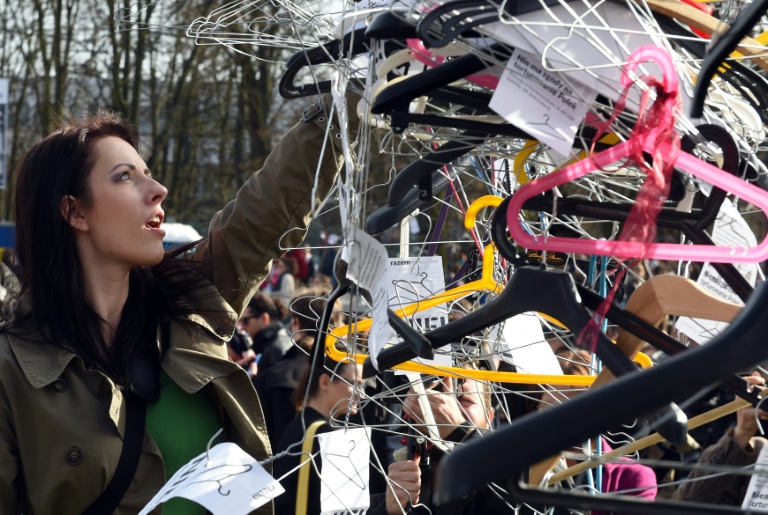Poland: Thousands protest against abortion ban
Right-wing government seeks to tighten regulations in line with the teachings of the Catholic Church

A free daily email with the biggest news stories of the day – and the best features from TheWeek.com
You are now subscribed
Your newsletter sign-up was successful
Thousands of people protested in Poland yesterday against government plans to ban abortion, with demonstrators in Warsaw waving coat hangers in a grim reference to back-street terminations.
Access to abortions is already strictly controlled in the country. Women can be granted one only if their own health is at risk, their foetus is terminally ill or severely disabled, or if they are pregnant by criminally proven rape or incest.
Now the ruling Law and Justice party looks set to introduce the total ban favoured by the Catholic Church, to which it has strong links.
The Week
Escape your echo chamber. Get the facts behind the news, plus analysis from multiple perspectives.

Sign up for The Week's Free Newsletters
From our morning news briefing to a weekly Good News Newsletter, get the best of The Week delivered directly to your inbox.
From our morning news briefing to a weekly Good News Newsletter, get the best of The Week delivered directly to your inbox.
Party leader Jaroslaw Kaczynski and Prime Minister Beata Szydlo have both said they will vote for a ban and they believe a majority of their MPs will follow suit. Law and Justice controls both houses of parliament.
Kaczynski said that, as a Catholic, he is "subject to the teachings of bishops" on the issue.
The demonstration is just the latest of several mass protests since Law and Justice came into power last year. Its socially conservative government has been criticised by international rights groups and other governments, says the Wall Street Journal.
The party has become increasingly autocratic, taking over the state broadcaster and trying to reshape the country's constitutional court, which it said was hampering its ability to govern.
A free daily email with the biggest news stories of the day – and the best features from TheWeek.com
The demonstrations in Warsaw yesterday were supported by opposition parties. One banner read: "Abortion for the government."
Marcelina Zawisza, of the socialist Razem party, said: "We can't agree for women to be forced to live nine months aware that they'll give birth to a foetus without a head, lungs or heart. The UN say it clearly: it's torture for women."
The legislation banning terminations was drafted by Ordo Iuris, a group of conservative Catholic lawyers, and endorsed by the Conference of Polish Episcopacy.
The lawyers are also pressing for a ban on same-sex marriage, also a policy promoted by the Catholic Church.
-
 Local elections 2026: where are they and who is expected to win?
Local elections 2026: where are they and who is expected to win?The Explainer Labour is braced for heavy losses and U-turn on postponing some council elections hasn’t helped the party’s prospects
-
 6 of the world’s most accessible destinations
6 of the world’s most accessible destinationsThe Week Recommends Experience all of Berlin, Singapore and Sydney
-
 How the FCC’s ‘equal time’ rule works
How the FCC’s ‘equal time’ rule worksIn the Spotlight The law is at the heart of the Colbert-CBS conflict
-
 Epstein files topple law CEO, roil UK government
Epstein files topple law CEO, roil UK governmentSpeed Read Peter Mandelson, Britain’s former ambassador to the US, is caught up in the scandal
-
 Iran and US prepare to meet after skirmishes
Iran and US prepare to meet after skirmishesSpeed Read The incident comes amid heightened tensions in the Middle East
-
 Israel retrieves final hostage’s body from Gaza
Israel retrieves final hostage’s body from GazaSpeed Read The 24-year-old police officer was killed during the initial Hamas attack
-
 China’s Xi targets top general in growing purge
China’s Xi targets top general in growing purgeSpeed Read Zhang Youxia is being investigated over ‘grave violations’ of the law
-
 Panama and Canada are negotiating over a crucial copper mine
Panama and Canada are negotiating over a crucial copper mineIn the Spotlight Panama is set to make a final decision on the mine this summer
-
 Why Greenland’s natural resources are nearly impossible to mine
Why Greenland’s natural resources are nearly impossible to mineThe Explainer The country’s natural landscape makes the task extremely difficult
-
 Iran cuts internet as protests escalate
Iran cuts internet as protests escalateSpeed Reada Government buildings across the country have been set on fire
-
 US nabs ‘shadow’ tanker claimed by Russia
US nabs ‘shadow’ tanker claimed by RussiaSpeed Read The ship was one of two vessels seized by the US military